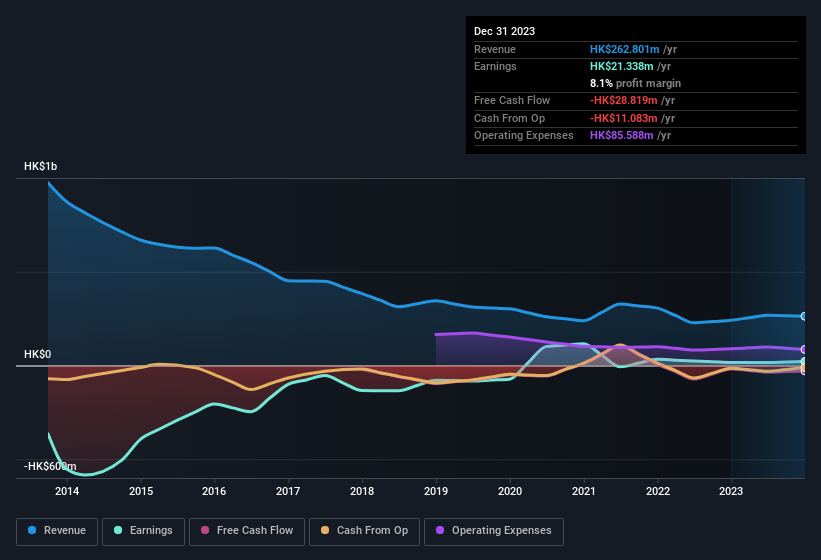Shareholders In Dynasty Fine Wines Group (HKG:828) Should Look Beyond Earnings For The Full Story

Strong earnings weren't enough to please Dynasty Fine Wines Group Limited's (HKG:828) shareholders over the last week. We did some digging and found some underlying numbers that are worrying.
Check out our latest analysis for Dynasty Fine Wines Group

Examining Cashflow Against Dynasty Fine Wines Group's Earnings
In high finance, the key ratio used to measure how well a company converts reported profits into free cash flow (FCF) is the accrual ratio (from cashflow). The accrual ratio subtracts the FCF from the profit for a given period, and divides the result by the average operating assets of the company over that time. This ratio tells us how much of a company's profit is not backed by free cashflow.
As a result, a negative accrual ratio is a positive for the company, and a positive accrual ratio is a negative. While it's not a problem to have a positive accrual ratio, indicating a certain level of non-cash profits, a high accrual ratio is arguably a bad thing, because it indicates paper profits are not matched by cash flow. That's because some academic studies have suggested that high accruals ratios tend to lead to lower profit or less profit growth.
Over the twelve months to December 2023, Dynasty Fine Wines Group recorded an accrual ratio of 0.46. As a general rule, that bodes poorly for future profitability. And indeed, during the period the company didn't produce any free cash flow whatsoever. Even though it reported a profit of HK$21.3m, a look at free cash flow indicates it actually burnt through HK$29m in the last year. Coming off the back of negative free cash flow last year, we imagine some shareholders might wonder if its cash burn of HK$29m, this year, indicates high risk. Having said that, there is more to consider. We can look at how unusual items in the profit and loss statement impacted its accrual ratio, as well as explore how dilution is impacting shareholders negatively.
Note: we always recommend investors check balance sheet strength. Click here to be taken to our balance sheet analysis of Dynasty Fine Wines Group.
In order to understand the potential for per share returns, it is essential to consider how much a company is diluting shareholders. As it happens, Dynasty Fine Wines Group issued 13% more new shares over the last year. Therefore, each share now receives a smaller portion of profit. To celebrate net income while ignoring dilution is like rejoicing because you have a single slice of a larger pizza, but ignoring the fact that the pizza is now cut into many more slices. You can see a chart of Dynasty Fine Wines Group's EPS by clicking here.
How Is Dilution Impacting Dynasty Fine Wines Group's Earnings Per Share (EPS)?
Dynasty Fine Wines Group's net profit dropped by 82% per year over the last three years. The good news is that profit was up 31% in the last twelve months. On the other hand, earnings per share are only up 24% over the same period. And so, you can see quite clearly that dilution is influencing shareholder earnings.
In the long term, earnings per share growth should beget share price growth. So Dynasty Fine Wines Group shareholders will want to see that EPS figure continue to increase. But on the other hand, we'd be far less excited to learn profit (but not EPS) was improving. For the ordinary retail shareholder, EPS is a great measure to check your hypothetical "share" of the company's profit.
How Do Unusual Items Influence Profit?
Given the accrual ratio, it's not overly surprising that Dynasty Fine Wines Group's profit was boosted by unusual items worth HK$13m in the last twelve months. While we like to see profit increases, we tend to be a little more cautious when unusual items have made a big contribution. When we crunched the numbers on thousands of publicly listed companies, we found that a boost from unusual items in a given year is often not repeated the next year. And, after all, that's exactly what the accounting terminology implies. Dynasty Fine Wines Group had a rather significant contribution from unusual items relative to its profit to December 2023. As a result, we can surmise that the unusual items are making its statutory profit significantly stronger than it would otherwise be.
Our Take On Dynasty Fine Wines Group's Profit Performance
In conclusion, Dynasty Fine Wines Group's weak accrual ratio suggested its statutory earnings have been inflated by the unusual items. The dilution means the results are weaker when viewed from a per-share perspective. On reflection, the above-mentioned factors give us the strong impression that Dynasty Fine Wines Group'sunderlying earnings power is not as good as it might seem, based on the statutory profit numbers. With this in mind, we wouldn't consider investing in a stock unless we had a thorough understanding of the risks. Be aware that Dynasty Fine Wines Group is showing 4 warning signs in our investment analysis and 1 of those is a bit unpleasant...
In this article we've looked at a number of factors that can impair the utility of profit numbers, and we've come away cautious. But there is always more to discover if you are capable of focussing your mind on minutiae. Some people consider a high return on equity to be a good sign of a quality business. While it might take a little research on your behalf, you may find this free collection of companies boasting high return on equity, or this list of stocks that insiders are buying to be useful.
New: Manage All Your Stock Portfolios in One Place
We've created the ultimate portfolio companion for stock investors, and it's free.
• Connect an unlimited number of Portfolios and see your total in one currency
• Be alerted to new Warning Signs or Risks via email or mobile
• Track the Fair Value of your stocks
Have feedback on this article? Concerned about the content? Get in touch with us directly. Alternatively, email editorial-team (at) simplywallst.com.
This article by Simply Wall St is general in nature. We provide commentary based on historical data and analyst forecasts only using an unbiased methodology and our articles are not intended to be financial advice. It does not constitute a recommendation to buy or sell any stock, and does not take account of your objectives, or your financial situation. We aim to bring you long-term focused analysis driven by fundamental data. Note that our analysis may not factor in the latest price-sensitive company announcements or qualitative material. Simply Wall St has no position in any stocks mentioned.
About SEHK:828
Dynasty Fine Wines Group
An investment holding company, produces and sells grape wine products in the People’s Republic of China.
Flawless balance sheet with proven track record.
Market Insights
Community Narratives



